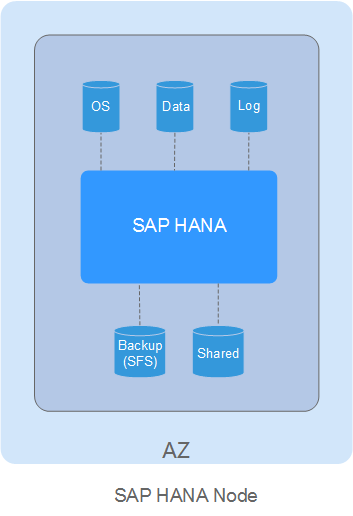Node and Role
SAP HANA Node
SAP HANA nodes are logical units that constitute an SAP HANA system. An SAP HANA node contains the CPU, memory, and storage (such as log, data, shared, and backup volumes) resources with specified specifications, as shown in Figure 1.
SAP HANA Studio
SAP HANA Studio provides management, monitoring, and information modeling of the SAP HANA system. It can also function as a client and provides capabilities to access user data. The information that the SAP HANA Studio provides includes the system information (such as software version), alarm information (generated by Statistics Server), and statistics of key system resources.
NAT Server
Provides the capability to switch to the HANA ECS using SSH. It allows you to switch to an SAP HANA node from the NAT server using Secure Shell (SSH).
SFS
Scalable File Service (SFS) provides the file sharing service. Create a file system to provide the backup volumes and the shared path to SAP HANA nodes.
SAP HANA Roles
In SAP HANA cluster deployment mode, the roles assigned to SAP HANA nodes are shown in Figure 2.
Each SAP HANA node has the NameServer and IndexServer processes. Table 1 provides the roles of the processes.
|
Process |
Type |
Description |
|---|---|---|
|
NameServer |
Configured Role |
Initially configured roles
|
|
Actual Role |
Activated roles due to the election mechanism
|
|
|
IndexServer |
Configured Role |
Initially configured roles
|
|
Actual Role |
Activated roles due to the election mechanism
|
Feedback
Was this page helpful?
Provide feedbackThank you very much for your feedback. We will continue working to improve the documentation.See the reply and handling status in My Cloud VOC.
For any further questions, feel free to contact us through the chatbot.
Chatbot







